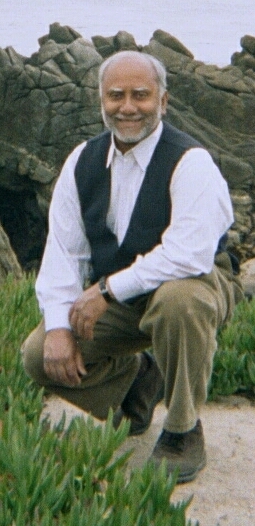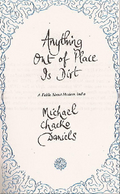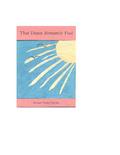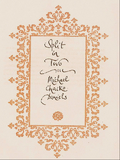A Letter From A Writer Of Stories
____________________________________________________
The Wounded Heart Mends,
Turns to Writing
_______________________________
I want to personally thank all those who have written to me since I left the Jobs for Homeless Consortium in 2004. I always look forward to hearing how you're doing on your individual journeys. Some have wondered what I'm doing, both in terms of physical and emotional recovery, after my long stint working with and for homeless persons and the community of persons with disabilities in Berkeley and Oakland.
And some have been so kind as to send me job leads and offers of help.
Thank you. Each of your responses meant a great deal to me.
I will not be so out of touch with myself as to say that the end of the Consortium did not break my heart. It did. But as I wrote in a couple of e-mails, in my community work my heart was broken a couple of times before. For me, putting my heart in my work was far more important than that it could get wounded. And I have learned over six decades that recovery comes from putting your heart out again, not from turning to stone.
The broken heart mends.
If you have known me mainly in my community service work, you would be interested to know that I started out as a writer of stories, in prose and poetry, and that part has never really been far from me. Take me out of the community service box and what you will find is the person who wants, if I may paraphrase Milton's words, to know, to utter, to argue according to my conscience above all other liberties.
In 2005, I spent quite a bit of time putting up my website, learning the mechanics from scratch, and incorporated content that includes a range of interests. I also did a lot of editing and creative writing.
My website is called US-India Writing Station. It can be accessed using the following URL: www.indiawritingstation.com. Companion sites at blogspot.com contain individual interviews and articles from Career Visions for a Small Planet, all of these companion sites can be accessed through www.careervisions.blogspot.com. I hope you have the time to visit.
Taking advantage of today's newsprint-free green technology and the global information superhighway, in 2005, I revived--New River Free Press, a community newspaper I published as a labor of love in Grand Rapids, Michigan, in the 1970s and gave it a new, universal home at US-India Writing Station and an expanded name--New River Free Press International.
Since I left Jobs for Homeless Consortium, I have edited the three books--two novels, Anything Out of Place Is Dirt and That Damn Romantic Fool, and a collection of poems, Split in Two--that I wrote in my twenties (except for a few poems of later vintage). I am happy to report that the revised second editions are out and have arrived from India.
Each copy is beautifully handcrafted, a work of art in itself.
In a world of automated printing and copying, the art of creating books by hand is not fully appreciated. Each time I handle one of these books, I feel honored to have my work memorialized by the traditional craftspeople in Calcutta, India, who contributed their skills to these creations.
Even if my artistic skills as a poet and novelist does not strike a responsive chord in you, I am sure the look and feel of the books will.
Below, you will find more information on the two books.
Best wishes on your many endeavors.
Michael Chacko Daniels
"I found myself entranced by the evocative,
poetic, often soaring beauty of the writing."
"Barthalomew's search for love, meaning,
and societal healing is also youth's quest."
--From the Second Revised Edition 2004, Introduction by Naomi Rose
Michael Chacko Daniels’
Fable About Modern India
Anything Out of Place Is Dirt
__________________________________________
Another time and place
____________________________
An Introduction by Naomi Rose
In reading Michael Chacko Daniels’ early novel, Anything Out of Place Is Dirt, recently published in a revised second edition, I found myself entranced by the evocative, poetic, often soaring beauty of the writing.
The narrator, an Indian atypically named Barthalomew, is young and intensely self-conscious; but I soon found endearing his painful, sincere efforts to connect with other people and the factionalized society around him.
I found myself willing to enter his closely examined world, expanding to include every one of his paradoxical qualities—as when he looks up at an office clock on the wall, remembers that he is already wearing a wristwatch, and then, as if others were purposely watching him, aware of his awkward mistake, covers his traces by turning the knob of his watch as if to set it.
This intense self-consciousness, and the sincerity of heart confined beneath it, is tremendously touching. It is youth’s way to question existence while knowing so little of its reality; and Bartholomew’s search for love, meaning, and societal healing is also youth’s quest.
Yet the book has such detailed nuance that this is no polemic but an internal experience through another time and place, yet also timeless. Written when the author was in his twenties, Anything Out of Place Is Dirt still has great value and is worth a careful reading.
Even after the covers are closed, its yearning and song will linger.
______________________________________________
Naomi Rose is a writer and Book Developer whose work has appeared in Shaman's Drum, Intuition Journal, The Journal of Humanistic Psychology, Writer's Connection, The San Francisco Bay Guardian, The New Holistic Health Handbook, Writing, and many other publications. She is currently writing a book on writing a book. She can be reached at naomierose@yahoo.com.
Click here to view the entire book at Google Print.
A Writers Workshop Greenbird Book
Second Revised Edition 2004
Writers Workshop books are published by P. Lal from
162/92 Lake Gardens, Calcutta 700045, India.
Layout and lettering by P. Lal.
Printed by Abhijit Nath in a Lake Gardens Press.
Gold-embossed, hand-stitched, hand-pasted, and hand-bound by Tulamiah Mohiuddin with handloom sari cloth woven and designed in India, to provide visual beauty and what the publisher describes as “the intimate texture of book-feel.” The publisher, who glories in that “each WW publication is a hand-crafted artifact,” refuses to hide WW bindings “concealed behind ephemeral glossy jackets.”
ISBN 81-8157-270-X (Hardback Limited Edition)
ISBN 81-8157-271-8 (Flexiback Limited Edition)
_______ * ______
Michael Chacko Daniels'
Tale of Narayanan and Joseph:
That Damn Romantic Fool
Journeying from the battle lines of the
intellect to the heart's warm embrace,
the characters in Michael Chacko Daniels'
novel struggle with what keeps us apart
and might bring us together.
Two Young Men
Have A Friendship--
Or Do They?
From An Introduction By Naomi Rose
Whenever a good story tells the truth by going deeply into the motivations and self-deceptions of its characters, its details and location become, simply, where we are when we are inside the story. Michael Chacko Daniels’ novel, That Damn Romantic Fool, takes us inside a time and place and kind of friendship that enlarges our sense of ourselves, invites us to look at the characters and thereby ourselves, and gives us a wider sense of who we are.
That Damn Romantic Fool continues Daniels’ first novel, Anything Out of Place Is Dirt. Unlike the earlier novel, where Narayanan was a foil to reveal the romantic nature of the main character, Barthalomew, here he is the central character, and it is he who is revealed.
The relationship between Narayanan and his friend, a younger man named Joseph whose upper-middle-class parents are frequently tangled in dramatic fights about money, is the heart of this novel. Narayanan, a college teacher of Ethics and Mathematics, is attractive, impeccable, disposed to think of himself as both righteous and dispassionate—and, for the most part, impenetrable.
Now thirty, he befriends Joseph as a self-appointed mentor, convinced that he sees the error of Joseph’s ways and can point him in the right direction—his own. “No one could have budged him from his mission,” we learn early on, “not even his beloved ammachi, who instinctively distrusted such passions that inevitably replaced one’s centre with that of another’s.”
But “relationship” is a wishful word. Their friendship is characterised by verbal duels. The connection between the two men takes place largely in the form of debates and arguments about everything the older man believes in: revolutionary politics rather than Joseph’s more peaceful view; literature as pure sound and rhythm, rather than introspective writing—in short, almost anything. Narayanan puts forth these arguments to sway Joseph to his own view, utterly certain that he is right and that Joseph will go the way of Barthalomew if not set on the righteous path.
Yet beneath all these verbal duels, there is a passionate drama going on.
For Joseph, these debates are a way to get closer to Narayanan. He seeks not his mentor’s certainty but his acknowledgment and affection. But all the swordplay costs Joseph hope and energy, for Narayanan is unable to give the affection and caring that his friend seeks. Joseph, hoping to become a novelist and turn his penchant for what he calls “navel gazing” to good and literary use, confides his dreams to Narayanan. But Narayanan lectures on, moulding and remoulding, persistently attempting to convert Joseph to his own ways.
Narayanan is truly a youthful character, full of ideas, schemes, and certainties that have not been tried and leavened by maturing. Most significantly, however, he has a self-absorption that passes itself off as brilliant self-examination. “The beggar man who was pulled out of a hole of a dwelling on Chowpatty this evening,” he thinks to himself, “would not have died if things were not as they are. Something will have to be done about it. I must make a decision about the way things are and what should be done about them.”
As the magnifying glass of narration makes us privy to his intricate and self-justifying thoughts and motivations, we begin to see behind the rather elegant façade that counterfoiled the rhapsodic Barthalomew in the first novel of this series. We see in Narayanan a man who believes that he truly knows himself, but whose intellect stops him from experiencing the most basic feelings. When a road worker is hit by a car outside his building, while his mother is exclaiming and trying to decide how to help, Narayanan asks, “Why do people have such big cars in such a poor country?”
He has rules, schemes, ideas about everything, scales of measurement by which he almost always comes out looking good in his own eyes; but his heart is closed off to the lived pain and joys of others. Yet the author draws him with such complexity and precision that eventually we recognise ourselves—our own self-certainties, our own arrogance bathed in the glow of higher motivations and charm, our own sense of separateness and loneliness replaced and fortified by ideas, positions, and opinions.
Joseph is more vulnerable than his friend, but his heart is alive, and his need for his friend is understandable. That Narayanan cannot take this in—that the intellect, all ideas and self-protection, cannot see what is happening or respond to it—turns out to have a tragic result, as Joseph sees Narayanan’s lack of care for what it is. Yet paradoxically, in Narayanan’s instant of realising the drastic result that his insistence on conversion has brought about at the end of the story, he turns himself into a human being. And this is his real beginning.
This exquisitely written novel, with its intricate ideas woven into a background of human emotions, gives us food for thought, people to look at and then, more empathetically, look into, and a lift of the heart, in sorrow and in joy, through the glorious language and images. One would not at all be a romantic fool for reading and enjoying That Damn Romantic Fool.
______
Naomi Rose is a writer, editor, and book developer who created and teaches the “Writing from the Deeper Self” approach to writing. Her current book projects are The Blessings Ledger: The Union of Money and Compassion, and The Book that Changes Your Life Is the One You Write Yourself. She lives in Oakland, California. She can be reached at naomierose@pon.net and through her website at www.essentialwriting.com.
A Writers Workshop Greenbird Book
Second Revised Edition 2005
Gold-embossed, hand-stitched, hand-pasted, and hand-bound by Tulamiah Mohiuddin with handloom sari cloth woven and designed in India, to provide visual beauty and what the publisher describes as “the intimate texture of book-feel.” The publisher, who glories in that “each WW publication is a hand-crafted artifact,” refuses to hide WW bindings “concealed behind ephemeral glossy jackets.”
ISBN 81-8157-356-0 (Hardback Limited Edition)
ISBN 81-8157-357-0 (Flexiback Limited Edition)
Visit Writers Workshop at www.writersworkshopkolkata.com
Beautiful, poignant, and wryly funny book
Front Page"Daniels is a deft artisan of language, as well
as a writer of open heart and keen intelligence.
He is equally home with family portraits,
philosophical musings, love poems, wry
self-reflection, and satire."
"Don't miss a rich reading opportunity."
From the Introduction by Ralph Dranow
Michael Chacko Daniels'
Split In Two
- Daniels is a deft artisan of language, as well as a writer of open heart and keen intelligence. He is equally at home with family portraits, philosophical musings, love poems, wry self-reflection, and satire.
- . . . this beautiful, poignant, and wryly funny book. Don’t miss a rich reading opportunity.
An Introduction by Ralph Dranow
Split in Two, Michael Chacko Daniel's revised and enlarged second edition of poems, published by Writers Workshop in Kolkata, India, is an elegant book in design and content.
This handcrafted, hardback edition, with its handsome cover, looks put together with exquisite care. And so do the poems. Daniels is a deft artisan of language, as well as a writer of open heart and keen intelligence. He is equally at home with family portraits, philosophical musings, love poems, wry self-reflection, and satire.
Included in the first section, San Francisco 1969-70, is the lovely poem "Waiting for India in His Room." The poem's narrator speaks of his difficulty fitting into a new culture, made strange by its "vague discords," and of his search for an authentic life:
"I know it will be today
the sunlight will become
a steady glow will grow on me
will call to mind
what it is to say
to a crow in monsoon lands
'I will sing of you' . . ."
"Settling into a Trickle" is also from this section. The poem reveals a high level of self-awareness, and also Daniels' inventiveness and risk-taking, his ability to create visually arresting poems by means of the placement of words and letters.
But who am I trying to fool?
I cannot erupt
not even boil
curdle
blister
through scales grown over
from other thoughts
arousals
desires
that
settle
me
into
at
r
i
c
k
l
e
From Section II, Bombay 1965-67, comes the transcendent "The Crow In Monsoon Lands":
His ugliness would mortify milady.
But my dear
See how he is beaten gold by the sun
And my dear could you with all your concoctions
Merge as he does his ebony-black
With sun-gold sky-blue tree-green cloud-grey?
And from the last section, Midas Can & Other Poems 1973-1990, comes the poignant poem written about Daniels' mother, who has just received a telegram announcing her mother's death.
Mother read the telegram,
then returned to the kitchen
and cleaned fish for father's
feverish diabetic dinner.
No culinary step was abbreviated
or clumsily forgotten.
Moment after moment,
movement after movement.
This continuity in mundane action
was her mother'sultimate hereditary success,
though death had cut the physical tie.
Only after the day's duty was done
did Mother retreat wordlessly
to the white-tiled bathroom,
where, drowned by the lukewarm shower,
she wrung out her pain.
This introduction just scratches the surface of the treasure trove that awaits you with this beautiful, poignant, and wryly funny book. Don’t miss a rich reading opportunity._________
Ralph Dranow is a widely published poet who lives and works in Oakland, California. He has an oral history business, “This Is Your Life,” and can be contacted at ralphdranow@yahoo.com.
Click here to view the entire book at Google Print.
A Writers Workshop Redbird Book
Second Revised Edition 2004
Gold-embossed, hand-stitched, hand-pasted, and hand-bound by Tulamiah Mohiuddin with handloom sari cloth woven and designed in India, to provide visual beauty and what the publisher describes as “the intimate texture of book-feel.” The publisher, who glories in that “each WW publication is a hand-crafted artifact,” refuses to hide WW bindings “concealed behind ephemeral glossy jackets.”
ISBN 81-8157-280-7 (Hardback Limited Edition)
ISBN 81-8157-281-5 (Flexiback Limited Edition)
Visit Writers Workshop at www.writersworkshopkolkata.com
An avid reader's comment about
Michael Chacko Daniels'
handcrafted books:
they look like little treasures."
--Brenda Coleman
a work of art in itself.
These three books are free,if ordered for the uncensored
permanent India, Asia, or
World Literature collections
of public or university
libraries. First preference willbe given to libraries that currentlyhave the first edition ofthese books. Ask your locallibrary to requestthe books today from:Michael Chacko DanielsPost Office Box 641724San Francisco, CA 94109
______ * ______
Michael Chacko Daniels' website,
US-India Writing Station?
If not, please do and be sure to
bookmark it. If you wish to
refer others to it, here's the URL:
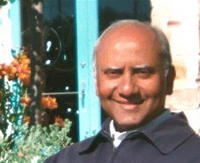 Feel free to visit, and explore: Fiction, Poetry, Community Service, Homeless, Commentary, & Discussion On The Road To Remaking The World We Live In . . . San Francisco, Grand Rapids, Evanston, Bombay, Kerala, Oakland, Berkeley, Monterey, Bangalore, Calcutta . . .
Feel free to visit, and explore: Fiction, Poetry, Community Service, Homeless, Commentary, & Discussion On The Road To Remaking The World We Live In . . . San Francisco, Grand Rapids, Evanston, Bombay, Kerala, Oakland, Berkeley, Monterey, Bangalore, Calcutta . . .Feel free to share the above link with others.
Sing an Indian Name, on Denver Syntax's free online magazine?
If not, here's the URL:
http://www.denversyntax.com/issue5/fiction/daniels/indian.html
____________________________
You are invited to visit
New River Free Press International's
Career Visions for a Small PlanetCheck Out the Visions of
People Remaking Our Planet
Issue #1: Valerie Street
Issue #2: Hong Hunt
Issue #3: Ian C. Dawkins Moore
Issue #4: Peter Lee Kline
Issue #5: Ralph Dranow
Issue #6: Joseph Kaval
Issue #7: Quentine Acharya
Issue #8: Narendra Jadhav
Issue #9: Trash Pickers of Grand Rapids
Issue #10: Amanda Gerrie
And the following
Popular History Pages
/housing-conspiracies-michigan/
/open-housing-grand-rapids-1976/
/cities-survival-william-thrall/
/faith-society-father-ed-monroe/
/faith-society-praying-polish/
/zoo-cruelty-animals-michigan/
/food-coops-for-a-small-planet/
____________ * ____________
